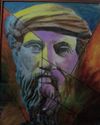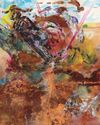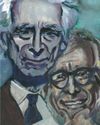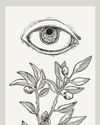
John Dewey, the father of American Pragmatism, spearhead in the field of education and psychology, acclaimed author and prominent twentieth century scholar, also had a deep appreciation for the arts. More specifically, he had a love for poetry. He even wrote some poems of his own, which were eventually discovered among his papers and published in a volume many years after his death.
Dewey (1859-1952) found himself alive during a time of incredible turmoil, industrialization, economic growth, and scientific advancement. With so many aspects of modern life changing from day to day, perhaps it's not surprising if he sought solace in poetry. It seems that for Dewey writing verse may have been more than a cathartic creative outlet or an artsy hobby. In fact, Dewey thought that poetry could be the replacement that fills the spiritual void left in the West by the decline in religious faith and in the traditions of the past. This is the notion he put forward in a commencement address to the graduating class of Smith College in the spring of 1890. As the young scholars eagerly awaited the completion of the final formality of their college educations, Dewey opened his speech with a passage from The Study of Poetry by English literary critic and poet Matthew Arnold:
Esta historia es de la edición December 2022 / January 2023 de Philosophy Now.
Comience su prueba gratuita de Magzter GOLD de 7 días para acceder a miles de historias premium seleccionadas y a más de 9,000 revistas y periódicos.
Ya eres suscriptor ? Conectar
Esta historia es de la edición December 2022 / January 2023 de Philosophy Now.
Comience su prueba gratuita de Magzter GOLD de 7 días para acceder a miles de historias premium seleccionadas y a más de 9,000 revistas y periódicos.
Ya eres suscriptor? Conectar

FALLING DOWN
Thomas R. Morgan considers how personal identity is maintained, and how it is lost.

Pythagoras (570-495 BCE)
Daniel Toré looks beyond the mathematician to the philosopher.

Wordsworth & Darwin
Christine Avery wonders whether poetry can help us to deal with science.

Plants & Philosophy
Caroline Deforche sees similarities between gardening and philosophising.

Dr.Gindi sculptor, has a philosophical conversation with Richard Baron about sensation, life, infinity and, you guessed it, sculpture.
Dr. Gindi is one of Switzerland's foremost sculptors, whose work has been exhibited in many countries.

Thomas Aquinas on Extraterrestrial Life
Babatunde Onabajo tells us why Aquinas did not believe in aliens.

The Fire This Time
Tim Madigan on Ray Bradbury, Bertrand Russell and Fahrenheit 451.

Trust, Truth & Political Conversations
Adrian Brockless wants a recognition of human value in political debate.

Philosophy & The Crown
Vincent Di Norcia on monarchy and stability.

Technologists & Ethicists
Stephen L. Anderson laments inadequate moral insight among tech leaders.